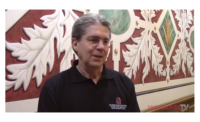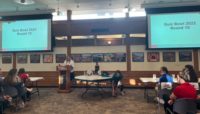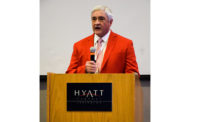Q&A with AMSA Student Board President on future goals for the organization
This video is brought to you by Zoetis. Discover more about antimicrobial solutions for meat and poultry processing at ZoetisUS.com/foodsafety.
Andy Hanacek: I’m here with Bo Hutto, a graduate student in meat science at Texas Tech University, and he is the incoming student board president for AMSA. Here we are, Bo, thanks for joining me. The first thing I wanted to ask you about, as the incoming student board president, I don’t know if it is like politics with a platform and a plan of attack. What are some of your goals here as student board president in terms of furthering AMSA’s mission especially in your area?
Bo Hutto: Each year we sit down as a student board, and we develop a strategic plan or a plan of attack, if you will. What do we want to accomplish as a board? This last year, we made some really good goals, set some goals and did well trying to reach those goals. I want to continue on the things we worked on. We will have our fall board meeting and develop more goals for the next year. Some things that I really want to push for is an increase in student involvement. I’ve been to a few of these Reciprocal Meat Conferences, and I have been associated with AMSA for five years now. I can tell you it’s the greatest thing and the greatest organization I’ve ever been a part of, and I want to share that with students. I’ve been so blessed to learn so much, meet so many great people, develop so many great relationships coming to these RMCs and going to regional conferences that we host throughout the year. I want to be able to share that with students. It would be selfish of me to have all this fun and not promote this to others. That’s my main goal to increase student involvement in committee plannings, attendance at regional conferences as well as scholarship applications.
Hanacek: That’s pretty cool because I know I’ve been to three of the last five RMCs, and every one I have gone to, there are more and more students every year that are participating, specifically in RMC. The student involvement has already ticked up, so that’s impressive that you are trying to add to that.
Hutto: I agree. Not necessarily getting them there, but getting them involved when they are there. Numbers don’t lie. There are more and more students coming every year, which is awesome. I want to go for quality, not necessarily quantity. I want the best combination of both. I want a lot of people there and everybody giving input and proposing ideas and such. We have a few different committees that the students have. We have the fundraising committee, social committee, product development committee, leadership committee and then reciprocation committee, which is in charge of putting together reciprocation sessions that are student sponsored, like yours was this year.
Hanacek: Thank you very much for that.
Hutto: I think you did a good job.
Hanacek: I think so too, but I’m a little biased.
Hutto: So I really want to increase student involvement on those committees. You come here to this big conference and see all these people… You’ve read all these scientific articles and papers and you see these names of legendary meat scientists. You come here and you see those people, and you say ‘Oh my gosh! I’m just a little sophomore or freshman. What am I doing here?’ I want to try to make those younger students feel more welcome and encouraged to participate and not feel so intimidated like I was when I was that age.
Hanacek: Star struck, and I’m sure it is there first conference in their careers in many instances too.
Hutto: So that’s a big goal of mine. Increase their involvement by making them feel like they can be heard.
Hanacek: Moving on to what you are working on outside of AMSA. Do you want to talk about some of the research you are working on now or just wrapping up that the industry should know about?
Hutto: I actually did an internship at the USDA Meat Animal Research Center in Nebraska last summer and got to know those guys really well. For some reason, they liked me. I was very fortunate to do my Master’s research project with them this year, so we’re working on evaluating beef tenderness and cooking loss on beef strip steaks and evaluating freezing at different points in the aging process. Typically, freezing is done at the end of the aging process, but we are looking at what changes can you see if the meat was frozen at a different point in the aging process. We’ve done a few data collections. We are looking into that, but we haven’t analyzed that yet. We’ve got a good start. It’s been a lot of fun. I really enjoyed working with those guys. They are world-renowned scientists. They make me look really good.
Hanacek: Next year’s RMC is going to be in your neck of the woods in San Angelo, Texas. Are you looking forward to next year?
Hutto: Yes, that’s not far from where I go to school. I am very much looking forward to next year. Those guys down there at Angelo State are so excited, and that makes me excited. I think there is a lot of potential at Angelo State to be very unique. I think they are going to have the potential to out and do exactly what they want, because there are so many options. They can go and do pretty much anything they want. They don’t have any restrictions. So I’m really looking forward to it, and I’ve heard some of the ideas the people at Angelo State have had and it sounds really promising.
Hanacek: Thanks for your time, Bo.
Looking for a reprint of this article?
From high-res PDFs to custom plaques, order your copy today!






